Fleurs du Mal Magazine


Or see the index
In Her Own Words: The Life and Poetry of Aelia Eudocia is the first full-length study to examine Eudocia’s writings as a unified whole and to situate them within their wider fifth-century literary, social, and religious contexts.
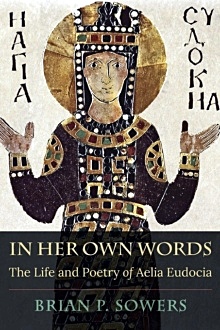 Responsible for over 3,000 lines of extant poetry, Eudocia is one of the best-preserved ancient female poets. Because she wrote in a literary mode frequently suppressed by proto-orthodox (male) leaders, much of her poetry does not survive, and what does survive remains understudied and underappreciated.
Responsible for over 3,000 lines of extant poetry, Eudocia is one of the best-preserved ancient female poets. Because she wrote in a literary mode frequently suppressed by proto-orthodox (male) leaders, much of her poetry does not survive, and what does survive remains understudied and underappreciated.
This book represents a detailed investigation into Eudocia’s works: her epigraphic poem in honor of the therapeutic bath at Hammat Gader, her Homeric cento—a poetic paraphrase of the Bible using lines from Homer—and her epic on the fictional magician-turned-Christian, Cyprian of Antioch.
Reading her poetry as a whole and in context, Eudocia emerges as an exceptional author representing three unique late-antique communities: poets interested in preserving and transforming classical literature; Christians whose religious views positioned them outside and against traditional power structures; and women who challenged social, religious, and literary boundaries.
Brian P. Sowers is Assistant Professor of Classics at Brooklyn College, City University of New York.
In Her Own Words
The Life and Poetry of Aelia Eudocia
Brian P. Sowers
Hellenic Studies Series 80
Harvard University Press
Paperback
ISBN 9780674987371
275 pages
€22.50
Publication: January 2019
# new books
Aelia Eudocia
Life and work – poetry
fleursdumal.nl magazine
More in: - Book News, Archive E-F, Archive E-F, Archive S-T, Art & Literature News, CLASSIC POETRY
Jean Cocteau (1889-1963) is een tot de verbeelding sprekend kunstenaar.
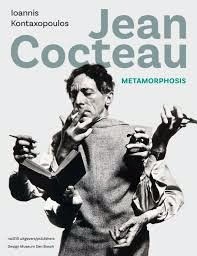 Hij uitte zich in bijna alle artistieke media: van poëzie en literatuur, beeldende kunst en vormgeving tot theater en zijn favoriete medium: film.
Hij uitte zich in bijna alle artistieke media: van poëzie en literatuur, beeldende kunst en vormgeving tot theater en zijn favoriete medium: film.
Maar meer nog dan om zijn werk was Cocteau bekend om zijn opmerkelijke leven. Hij omgaf zich met beroemdheden als Sergei Diaghilev, Edith Piaf, Pablo Picasso en Coco Chanel en raakte geregeld in opspraak vanwege zijn homoseksualiteit en drugsgebruik. Design Museum Den Bosch presenteert de eerste grote overzichtstentoonstelling van Jean Cocteau in Nederland.
Jean Cocteau – Metamorphosis werpt licht op Cocteau’s voortdurende zelftransformatie en zijn zoektocht naar een eigen identiteit. Zoals jonge mensen zich tegenwoordig digitaal een identiteit aanmeten, had Cocteau de gave om zich via diverse media steeds met andere ogen te bezien en te laten zien.
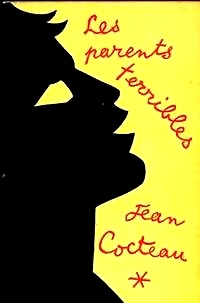 De tentoonstelling Jean Cocteau – Metamorphosis toont vele van deze gezichten, in tekeningen en schilderijen, wandtapijten en affiches, in foto en film. Een veelheid aan artistieke uitingsvormen die Cocteau alle als een zelfportret beschouwde
De tentoonstelling Jean Cocteau – Metamorphosis toont vele van deze gezichten, in tekeningen en schilderijen, wandtapijten en affiches, in foto en film. Een veelheid aan artistieke uitingsvormen die Cocteau alle als een zelfportret beschouwde
Al sinds de jaren negentig bevinden zich keramiek en sieraden van Cocteau in de collectie van het Design Museum Den Bosch.
Het werk van Jean Cocteau wijst vooruit naar de multidisciplinaire praktijk van ontwerpers en kunstenaars vvan vandaag. In onze tijd beperken Nederlandse ontwerpers als Bart Hess, Ted Noten en Studio Drift zich al evenmin tot één discipline maar verkennen de grenzen van kunst, design en digitale media.
De overzichtstentoonstelling Jean Cocteau – Metamorphosis bestaat uit meer dan 250 werken.
Vele belangrijke bruiklenen zijn verschaft door het Musée Jean Cocteau collection Séverin Wunderman uit Menton, Frankrijk, het enige aan Cocteau gewijde museum ter wereld, en door de verzameling Kontaxopoulos | Prokopchuk te Brussel, de grootste internationale privéverzameling van het werk van Cocteau.
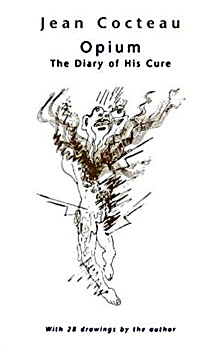 Daarnaast zijn er bruiklenen van o.m. Collection Cartier, Stedelijk Museum Amsterdam en de Koninklijke Verzamelingen.
Daarnaast zijn er bruiklenen van o.m. Collection Cartier, Stedelijk Museum Amsterdam en de Koninklijke Verzamelingen.
Belangrijke werken uit de bruiklenen zijn o.a. het wandkleed Judith et Holoferne uit Menton, het kunstenaarsboek Le Mystère de Jean l’Oiseleur uit Brussel, het zwaard Epée d’Académicien van Collection Cartier en het manuscript-gedicht Hommage à Igor Strawinsky uit de Koninklijke Verzamelingen, door president Mitterrand geschonken aan prins Claus tijdens een staatsbezoek in Parijs.
Documentaire: Nicolas Patrzynski (www.patrzynski.com) heeft een documentaire gemaakt van Jean Cocteau. Het leven en werk van Cocteau vloeien in dit werk prachtig in elkaar over. De documentaire maakt onderdeel uit van de tentoonstelling.
De tentoonstelling wordt mede mogelijk gemaakt door Mondriaan Fonds, Prins Bernhard Cultuurfonds en Turing Foundation.
Te zien van 10 november 2018 t/m 10 maart 2019
Jean Cocteau – Metamorphosis
Design Museum Den Bosch
De Mortel 4
5211 HV Den Bosch
Dinsdag t/m zondag 11 – 17 uur
Maandag gesloten
# more information Design Museum Den Bosch
fleursdumal.nl magazine
More in: Archive C-D, Art & Literature News, AUDIO, CINEMA, RADIO & TV, Exhibition Archive, Jean Cocteau, LGBT+ (lhbt+), Surrealism, SURREALISM, Surrealisme
Mort d’une surdose d’opium en 1919 à l’âge de vingt-trois ans, alors qu’il est encore sous l’uniforme, Jacques Vaché est reconnu comme celui par qui le surréalisme est arrivé.
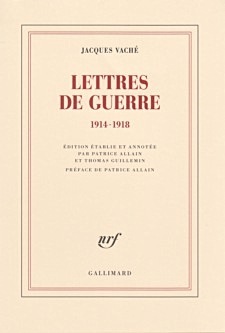 Du premier Manifeste à ses derniers Entretiens, André Breton aura toujours célébré celui qu’il appelait «l’homme que j’ai le plus aimé au monde».
Du premier Manifeste à ses derniers Entretiens, André Breton aura toujours célébré celui qu’il appelait «l’homme que j’ai le plus aimé au monde».
Et quinze Lettres de guerre, envoyées depuis le front à son ami poète ainsi qu’à Théodore Fraenkel et Louis Aragon, auront suffi pour que Vaché devienne l’arme secrète de plusieurs générations.
Breton révélait en 1919 son «Umour» sans H, surgi au milieu des combats, l’expression poétique la plus pure de l’humour noir et de la «désertion intérieure».
Présenter pour la première fois l’intégralité des lettres écrites par Jacques Vaché à sa famille et à ses amis pendant la guerre (158 dont 23 totalement inédites) permet de marquer le point de départ d’une aventure moderne et de mettre en lumière le soldat en action, la vocation prometteuse du dessinateur et la singularité du «dandy des tranchées».
Jacques Vaché:
Lettres de guerre (1914-1918)
Édition de Patrice Allain et Thomas Guillemin.
Préface de Patrice Allain
Collection Blanche, Gallimard
Parution: 08-11-2018
480 pages,
ill.,
140 x 205 mm
Achevé d’imprimer: 01-10-2018
Genre : Correspondances
Prix: 24,00 €
# new books
Jacques Vaché:
Lettres de guerre (1914-1918)
fleursdumal.nl magazine
More in: #Biography Archives, *War Poetry Archive, - Book News, - Bookstores, Archive U-V, Archive U-V, Art & Literature News, Jacques Vaché, Opium-Eaters, Vaché, Jacques
An indispensable anthology of brilliant hard-to-find writings by Poe on poetry, the imagination, humor, and the sublime which adds a new dimension to his stature as a speculative thinker and philosopher. Essays (in translation) by Charles Baudelaire, Stéphane Mallarmé, Paul Valéry, & André Breton shed light on Poe’s relevance within European literary tradition.
These are the arcana of Edgar Allan Poe: writings on wit, humor, dreams, drunkenness, genius, madness, and apocalypse. Here is the mind of Poe at its most colorful, its most incisive, and its most exceptional.
 Edgar Allan Poe’s dark, melodic poems and tales of terror and detection are known to readers everywhere, but few are familiar with his cogent literary criticism, or his speculative thinking in science, psychology or philosophy. This book is an attempt to present his lesser known, out of print, or hard to find writings in a single volume, with emphasis on the theoretical and esoteric. The second part, “The Friend View,” includes seminal essays by Poe’s famous admirers in France, clarifying his international literary importance.
Edgar Allan Poe’s dark, melodic poems and tales of terror and detection are known to readers everywhere, but few are familiar with his cogent literary criticism, or his speculative thinking in science, psychology or philosophy. This book is an attempt to present his lesser known, out of print, or hard to find writings in a single volume, with emphasis on the theoretical and esoteric. The second part, “The Friend View,” includes seminal essays by Poe’s famous admirers in France, clarifying his international literary importance.
America has never seen such a personage as Edgar Allan Poe. He is a figure who appears once an epoch, before passing into myth. American critics from Henry James to T. S. Eliot have disparaged and attempted to explain away his influence to no end, save to perpetuate his fame. Even the disdainful Eliot once conceded, “and yet one cannot be sure that one’s own writing has not been influence by Poe.”
Edgar Allan Poe (1809-1849), born in Boston, Massachusetts, was an American poet, writer, editor, and literary critic. He is well known for his haunting poetry and mysterious short stories. Regarded as being a central figure of Romanticism, he is also considered the inventor of detective fiction and the growing science fiction genre. Some of his most famous works include poems such as The Raven, Annabel Lee, and A Dream Within a Dream; tales such as The Cask of Amontillado, The Masque of Red Death, and The Tell-Tale Heart.
Title: The Unknown Poe
Subtitle: An Anthology of Fugitive Writings
Author: Edgar Allan Poe
Edited by Raymond Foye
Publisher: City Lights Publishers
Format: Paperback
124 pages
1980
ISBN-10 0872861104
ISBN-13 9780872861107
List Price $11.95
# American writers
Edgar Allan Poe
fleursdumal.nl magazine
More in: - Book Lovers, - Book Stories, Archive O-P, Archive O-P, Art & Literature News, Edgar Allan Poe, Poe, Edgar Allan, Poe, Edgar Allan, Tales of Mystery & Imagination
Die Vielfalt von Rainer Maria Rilkes (1875 bis 1926) Lebensstationen spiegelt sich im Werk des “letzten Dichters” wider.
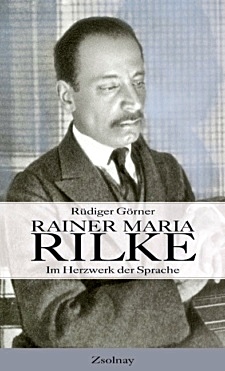 In dieser kompakten Darstellung folgt Rüdiger Görner Rilkes Spuren, verwehrt sich aber den gängigen Einordnungen und Periodisierungen. Es geht ihm vielmehr um den Prozess des Schaffens und um die Geschlossenheit des Werkes.
In dieser kompakten Darstellung folgt Rüdiger Görner Rilkes Spuren, verwehrt sich aber den gängigen Einordnungen und Periodisierungen. Es geht ihm vielmehr um den Prozess des Schaffens und um die Geschlossenheit des Werkes.
Görner zeigt Rilke in seiner Zeit und analysiert die wichtigsten Einflüsse. Auf behutsame Weise werden Leben und Werk miteinander verwoben, und Görner veranschaulicht die Wirkung der Musik, der bildenden Kunst und der Politik.
Rüdiger Görner, geboren 1957 in Rottweil, ist Professor für Neuere Deutsche und vergleichende Literatur an der Queen Mary University of London. Gründer des Ingeborg Bachmann Centre for Austrian Literature und Gründungsdirektor des Centre for Anglo-German Cultural Relations. Träger des Deutschen Sprachpreises, des Reimar Lüstpreises der Alexander von Humboldt-Stiftung und des Verdienstordens der Bundesrepublik Deutschland. Bei Zsolnay erschienen Rainer Maria Rilke. Im Herzwerk der Sprache (2004), Georg Trakl. Dichter im Jahrzehnt der Extreme (2014) und Oskar Kokoschka. Jahrhundertkünstler (2018).
Rüdiger Görner
Rainer Maria Rilke.
Im Herzwerk der Sprache
Buch – Fester Einband
344 Seiten
Deutscher Sprache
Zsolnay / Deuticke
Carl Hanser Verlag, München
ISBN 978-3-552-05302-1
2004
€24,90
# new books
Rainer Maria Rilke
fleursdumal.nl magazine
More in: - Book News, - Book Stories, Archive G-H, Archive Q-R, Art & Literature News, Rilke, Rainer Maria
A series of disruptive, unnerving sounds haunts the fictional writings of Franz Kafka.
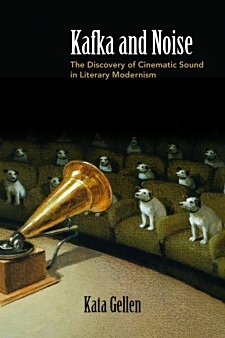 These include the painful squeak in Gregor Samsa’s voice, the indeterminate whistling of Josefine the singer, the relentless noise in “The Burrow,” and telephonic disturbances in The Castle.
These include the painful squeak in Gregor Samsa’s voice, the indeterminate whistling of Josefine the singer, the relentless noise in “The Burrow,” and telephonic disturbances in The Castle.
In Kafka and Noise, Kata Gellen applies concepts and vocabulary from film theory to Kafka’s works in order to account for these unsettling sounds. Rather than try to decode these noises, Gellen explores the complex role they play in Kafka’s larger project.
Kafka and Noise offers a method for pursuing intermedial research in the humanities—namely, via the productive “misapplication” of theoretical tools, which exposes the contours, conditions, and expressive possibilities of the media in question. This book will be of interest to scholars of modernism, literature, cinema, and sound, as well as to anyone wishing to explore how artistic and technological media shape our experience of the world and the possibilities for representing it.
Kata Gellen is an assistant professor in the Department of Germanic Languages and Literature at Duke University.
Kata Gellen (Author)
Kafka and Noise.
The Discovery of Cinematic Sound in Literary Modernism
272 pages
Northwestern University Press
Literary Criticism
Cloth Text – $99.95
ISBN 978-0-8101-3894-0
Paper Text – $34.95
ISBN 978-0-8101-3893-3
Publication Date: January 2019
# new books
The Discovery of Cinematic Sound in Literary Modernism
fleursdumal.nl magazine
More in: # Music Archive, #Archive A-Z Sound Poetry, #Archive Concrete & Visual Poetry, *Concrete + Visual Poetry K-O, - Book News, - Bookstores, Archive G-H, Archive K-L, Art & Literature News, Franz Kafka, Kafka, Franz, Kafka, Franz, Modernisme
Before the era of fake news and anti-fascists, William S. Burroughs wrote about preparing for revolution and confronting institutionalized power.
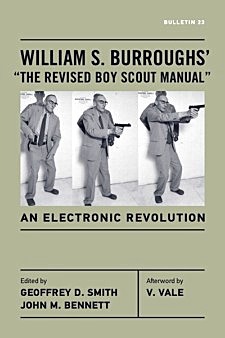 In this work, Burroughs’ parody becomes a set of rationales and instructions for destabilizing the state and overthrowing an oppressive and corrupt government. As with much of Burroughs’ work, it is hard to say if it is serious or purely satire. The work is funny, horrifying, and eerily prescient, especially concerning the use of language and social media to undermine institutions.
In this work, Burroughs’ parody becomes a set of rationales and instructions for destabilizing the state and overthrowing an oppressive and corrupt government. As with much of Burroughs’ work, it is hard to say if it is serious or purely satire. The work is funny, horrifying, and eerily prescient, especially concerning the use of language and social media to undermine institutions.
The Revised Boy Scout Manual was a work Burroughs revisited many times, but which has never before been published in its complete form.
Based primarily on recordings of a performance of the complete piece found in the archives at the OSU libraries, as well as various incomplete versions of the typescript found at Arizona State University and the New York Public Library archives, this lost masterpiece of satiric subversion is finally available in its entirety.
“He’s up there with the pope . . . you can’t revere him enough . . . he’s the greatest mind of our times.” — Patti Smith
“Well, he’s a writer.” —Samuel Beckett
“The Revised Boy Scout Manual offers easy-to-read proof that the uncensored human imagination allowed to freely extrapolate about future social change can offer outrageous scenarios and fresh language capable of inspiring readers decades into the future.” —V. Vale, founder and publisher of RE/Search
The Revised Boy Scout Manual
An Electronic Revolution
by William S. Burroughs
Edited by John M. Bennett, Geoffrey D. Smith
Publisher Ohio State University Press
Language: English
Format Paperback
Nb of pages: 144
ISBN-10 0814254896
ISBN-13 9780814254899
Publication 01 September 2018
$12.65
# new books
William S. Burroughs
The Revised Boy Scout Manual
fleursdumal.nl magazine
More in: #Beat Generation Archives, - Book News, Archive A-B, Art & Literature News, AUDIO, CINEMA, RADIO & TV, Burroughs, William S., Conceptual writing, Samuel Beckett, Smith, Patti
For the last 2,500 years literature has been attacked, booed, and condemned, often for the wrong reasons and occasionally for very good ones. The Hatred of Literature examines the evolving idea of literature as seen through the eyes of its adversaries: philosophers, theologians, scientists, pedagogues, and even leaders of modern liberal democracies.
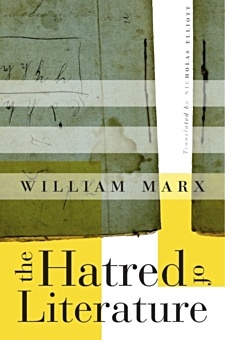 From Plato to C. P. Snow to Nicolas Sarkozy, literature’s haters have questioned the value of literature—its truthfulness, virtue, and usefulness—and have attempted to demonstrate its harmfulness.
From Plato to C. P. Snow to Nicolas Sarkozy, literature’s haters have questioned the value of literature—its truthfulness, virtue, and usefulness—and have attempted to demonstrate its harmfulness.
Literature does not start with Homer or Gilgamesh, William Marx says, but with Plato driving the poets out of the city, like God casting Adam and Eve out of Paradise. That is its genesis. From Plato the poets learned for the first time that they served not truth but merely the Muses. It is no mere coincidence that the love of wisdom (philosophia) coincided with the hatred of poetry. Literature was born of scandal, and scandal has defined it ever since.
In the long rhetorical war against literature, Marx identifies four indictments—in the name of authority, truth, morality, and society. This typology allows him to move in an associative way through the centuries. In describing the misplaced ambitions, corruptible powers, and abysmal failures of literature, anti-literary discourses make explicit what a given society came to expect from literature. In this way, anti-literature paradoxically asserts the validity of what it wishes to deny. The only threat to literature’s continued existence, Marx writes, is not hatred but indifference.
William Marx is Professor of Comparative Literature at the University of Paris Nanterre.
The Hatred of Literature
William Marx
Translated by Nicholas Elliott
Belknap Press
Harvard University Press
ISBN 9780674976122
Publ.: January 2018
Hardcover
240 pages
€27.00
# new books
William Marx – The Hatred of Literature
fleursdumal.nl magazine
More in: - Book News, - Book Stories, Archive M-N, Art & Literature News, MONTAIGNE, The Art of Reading, The talk of the town
Delphine Lecompte (1978) debuteerde in 2004 in het Engels met de roman Kittens in the Boiler, daarna schakelde ze over naar gedichten in haar moedertaal.
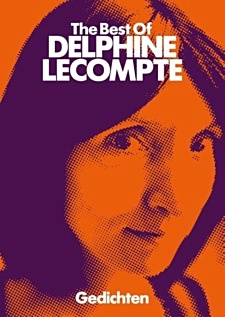 Voor haar debuutbundel De dieren in mij kreeg ze de C. Buddingh’-prijs 2010 en de Prijs Letterkunde 2011 van de Provincie West-Vlaanderen. Haar vorige bundel Dichter, bokser, koningsdochter werd genomineerd voor de VSB Poëzieprijs.
Voor haar debuutbundel De dieren in mij kreeg ze de C. Buddingh’-prijs 2010 en de Prijs Letterkunde 2011 van de Provincie West-Vlaanderen. Haar vorige bundel Dichter, bokser, koningsdochter werd genomineerd voor de VSB Poëzieprijs.
Het oeuvre van Delphine Lecompte vormt een ontembaar en onvoorspelbaar universum. In inmiddels zeven bundels bevraagt ze volstrekt genadeloos en vol branie zichzelf, de wereld en de poëzie.
Nu is het tijd voor een Best Of, waarin alle incestueuze imkers, gekwelde touwslagers, pedofiele tuinmannen, norse walvisjagers, morose windhondenfokkers, verwaarloosde hoefdieren, onbereikbare moeders en de geliefde oude kruisboogschutter een nieuw verband met elkaar aangaan. Ze bevolken een wereld die vol is van woede en gekte, maar ook van bezinning, verliefdheid en troost.
Best of Delphine Lecompte
Auteur: Delphine Lecompte
Taal: Nederlands
Poëzie
Uitgever: De Bezige Bij
Druk 1e druk
Omslagontwerp Moker Ontwerp
Foto auteur Koen Broos
Vormgeving binnenwerk Aard Bakker
Druk Bariet Ten Brink, Meppel
isbn 978 94 031 3720 9
nur 306
Afmetingen 24 x 17 x 1,2 cm
128 pagina’s
Paperback
November 2018
€ 19,99
# new books
Best of Delphine Lecompte
Poëzie
fleursdumal.nl magazine
More in: #Editors Choice Archiv, - Book News, - Bookstores, Archive K-L, Art & Literature News, Lecompte, Delphine
“Über Nacht war ich Winnetou!” ist für alle Filmfans ein wahrer Schatz: Drei Jahre nach dem Tod ihres Mannes Pierre Brice zeigt seine Frau Hella das über 50 Jahre lang behütete und zum Großteil unveröffentlichte private Fotomaterial des Winnetou-Schauspielers, entstanden am Rande der Dreharbeiten zu den Winnetou-Filmen.

Ergänzt werden diese Aufnahmen neben zahlreichen weiteren Fotos aus den Winnetou-Filmen unter anderem durch persönliche Briefe, Postkarten, Verträge und Vereinbarungen.
Persönliche Dokumente Pierre Brice’ runden diese einzigartige Sammlung von Memorabilia über einen der beliebtesten und populärsten Schauspieler der letzten 55 Jahre ab.
Pierre-Brice-Edition “Über Nacht war ich Winnetou!”
von Hella Brice
1960er Jahre – Dreharbeiten der Karl-May-Filme. ‘Pierre Brice-Edition’.
Fans von Pierre Brice, Karl May oder Filmen allgemein
Buch (gebunden)
223 Seiten
ISBN: 3780231018
EAN: 9783780231017
21, 4 cm / 30, 2 cm / 2, 0 cm ( B/H/T ).
Karl-May-Verlag
12. Oktober 2018
€ 39,00
# new books
Karl-May-Filme
Pierre Brice-Edition
fleursdumal.nl magazine
More in: - Book News, - Bookstores, Archive A-B, Archive M-N, Art & Literature News, AUDIO, CINEMA, RADIO & TV, Cowboys and Indians, Karl May
A writer who defies categorization, Daniil Kharms has come to be regarded as an essential artist of the modernist avant-garde.
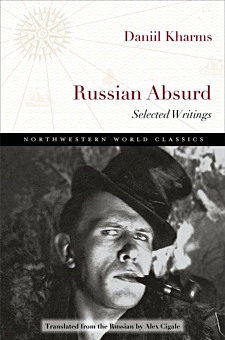 His writing, which partakes of performance, narrative, poetry, and visual elements, was largely suppressed during his lifetime, which ended in a psychiatric ward where he starved to death during the siege of Leningrad.
His writing, which partakes of performance, narrative, poetry, and visual elements, was largely suppressed during his lifetime, which ended in a psychiatric ward where he starved to death during the siege of Leningrad.
His work, which survived mostly in notebooks, can now be seen as one of the pillars of absurdist literature, most explicitly manifested in the 1920s and ’30s Soviet Union by the OBERIU group, which inherited the mantle of Russian futurism from such poets as Vladimir Mayakovsky and Velimir Khlebnikov.
This selection of prose and poetry provides the most comprehensive portrait of the writer in English translation to date, revealing the arc of his career and including a particularly generous selection of his later work.
DANIIL KHARMS (1905–1942) was a major figure in twentieth-century Russian and Soviet literature. An enigmatic and genre-bending artist, he was among the most significant voices in what came to be known as the literature of Russian absurdism.
ALEX CIGALE was awarded an NEA Literary Translation Fellowship in 2015. His translations from Russian and his original poetry in English have appeared in such journals as the New England Review, PEN America, TriQuarterly, and World Literature Today.
“…lively and funny… a profound and subtle testament to Kharms.” —Times Literary Supplement
Daniil Kharms:
Russian Absurd.
Selected Writings
Translated from the Russian by Alex Cigale
Northwestern World Classics
Poetry
February 2017
ISBN 978-0-8101-3457-7
280 pages
Trade Paper
$24.95
# new books
Russian Absurd
Selected Writings
Daniil Kharms;
Translated from the Russian by Alex Cigale
fleursdumal.nl magazine
More in: #Biography Archives, - Book News, Archive K-L, Archive K-L, Art & Literature News, Constructivism, Futurisme, Kharms (Charms), Daniil
“The staggering thing about a life’s work is it takes a lifetime to complete,” Craig Morgan Teicher writes in these luminous essays.
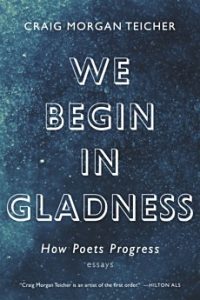 We Begin in Gladness considers how poets start out, how they learn to hear themselves, and how some offer us that rare, glittering thing: lasting work. Teicher traces the poetic development of the works of Sylvia Plath, John Ashbery, Louise Glück, and Francine J. Harris, among others, to illuminate the paths they forged—by dramatic breakthroughs or by slow increments, and always by perseverance.
We Begin in Gladness considers how poets start out, how they learn to hear themselves, and how some offer us that rare, glittering thing: lasting work. Teicher traces the poetic development of the works of Sylvia Plath, John Ashbery, Louise Glück, and Francine J. Harris, among others, to illuminate the paths they forged—by dramatic breakthroughs or by slow increments, and always by perseverance.
We Begin in Gladness is indispensable for readers curious about the artistic life and for writers wondering how they might light out—or even scale the peak of the mountain.
Though it seems, at first, like an art of speaking, poetry is an art of listening. The poet trains to hear clearly and, as much as possible, without interruption, the voice of the mind, the voice that gathers, packs with meaning, and unpacks the language the poet knows.
It can take a long time to learn to let this voice speak without getting in its way. This slow learning, the growth of this habit of inner attentiveness, is poetic development, and it is the substance of the poet’s art. Of course, this growth is rarely steady, never linear, and is sometimes not actually growth but diminishment—that’s all part of the compelling story of a poet’s way forward. —from the Introduction
Craig Morgan Teicher is an acclaimed poet and critic. He is the author of We Begin in Gladness: How Poets Progress, and three books of poetry, including The Trembling Answers, winner of the Lenore Marshall Poetry Prize, and he regularly writes reviews for Los Angeles Times, NPR, and the New York Times Book Review. He lives in New Jersey.
We Begin in Gladness.
How Poets Progress
by Craig Morgan Teicher
Publication Date 11/6/18
Format: Paperback
ISBN 978-1-55597-821-1
Subject: Literary Criticism
Pages 176
Graywolf Press
$16.00
# new books
more info: http://craigmorganteicher.com/
How Poets Progress
fleursdumal.nl magazine
More in: - Book Lovers, - Book Stories, Archive S-T, Archive S-T, Art & Literature News, Sylvia Plath, The Art of Reading
Thank you for reading Fleurs du Mal - magazine for art & literature